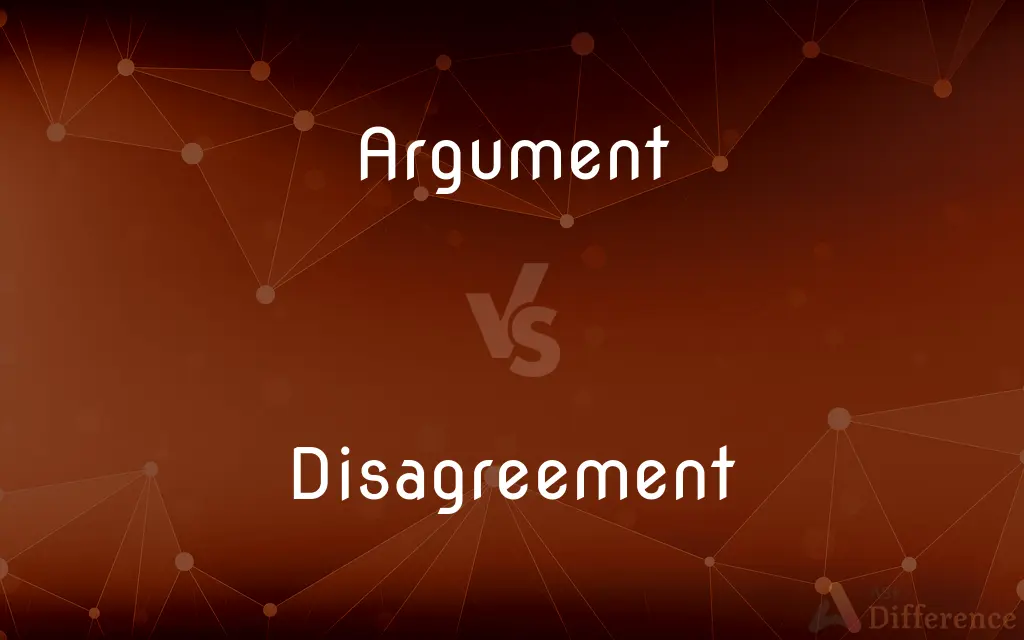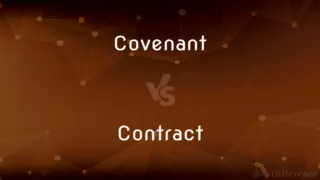Argument vs. Disagreement — What's the Difference?
By Fiza Rafique & Urooj Arif — Updated on March 15, 2024
An argument is a structured exchange of viewpoints with reasoning, aiming for persuasion, while a disagreement is simply a lack of consensus or differing opinions.

Difference Between Argument and Disagreement
Table of Contents
ADVERTISEMENT
Key Differences
An argument typically involves a more structured and reasoned exchange of ideas, where participants present evidence or logic to support their positions. It's a form of communication that aims not just to express a viewpoint but to persuade others of its validity. For instance, in a debate setting, each side constructs arguments to convince the audience of their stance. On the other hand, a disagreement may not involve structured reasoning or the intention to persuade. It's essentially a situation where two or more parties have different opinions or beliefs, regardless of the discussion's depth or the reasoning behind each stance.
Arguments often follow a logical structure, beginning with premises, followed by evidence, and concluding with a conclusion that logically derives from the presented information. This methodical approach is designed to strengthen the persuasiveness of the speaker's position. Disagreements, however, can exist without any formal structure and may arise from personal preferences, interpretations, or beliefs that don't necessarily rely on evidence or logical reasoning.
The purpose of an argument is usually to persuade or convince others of a particular point of view or to reach a conclusion based on reasoning. It's a fundamental component of critical thinking and academic discourse. In contrast, the purpose of expressing disagreement might not be to persuade but simply to state a differing opinion, whether or not it changes the other party's viewpoint.
Arguments can occur within a constructive framework, where the aim is to reach a better understanding of the topic or to find a resolution to a problem. In academic and professional contexts, arguments are encouraged as a means to explore ideas and test hypotheses. Disagreements, while they can also be constructive, often have a more immediate emotional component and may arise from personal values or experiences that are not aimed at reaching a consensus or a deeper understanding.
Despite their differences, both arguments and disagreements are natural parts of human interaction and communication. They can lead to positive outcomes, such as clearer understanding, closer relationships through the resolution of conflict, or the refinement of ideas and beliefs. However, the key to achieving these positive outcomes often lies in how the individuals involved manage the argument or disagreement, emphasizing respect, open-mindedness, and a willingness to listen.
ADVERTISEMENT
Comparison Chart
Definition
Structured exchange of ideas with reasoning
Lack of consensus or difference in opinion
Purpose
To persuade or convince
To express a differing viewpoint
Structure
Follows logical reasoning and evidence
May not have a structured form
Outcome
Seeks to reach a conclusion or understanding
May simply highlight differing views
Emotional Component
Can be present but secondary to logic
Often driven by personal feelings or values
Compare with Definitions
Argument
A reasoned discourse aiming to persuade.
Her argument on climate change was compelling, citing numerous studies.
Disagreement
A situation where opinions don't align.
There was a disagreement on the best approach to take.
Argument
Seeks to convince others through logic.
The debate team's argument was structured to systematically dismantle opposition.
Disagreement
Can arise from personal preferences or beliefs.
Their disagreement was more about personal taste than facts.
Argument
Involves presenting evidence to support a viewpoint.
He structured his argument with clear examples and statistics.
Disagreement
Doesn't necessarily aim to persuade.
Despite their disagreement, neither was trying to convince the other.
Argument
May lead to a deeper understanding of a topic.
Through our argument, we discovered overlooked aspects of the issue.
Disagreement
May not lead to resolution or consensus.
The disagreement remained, but they agreed to respect each other's views.
Argument
Focuses on critical thinking and reasoning.
Her argument reflected a deep analysis and understanding of the subject.
Disagreement
Can be immediate and emotional.
The disagreement stemmed from deeply held values.
Argument
In logic and philosophy, an argument is a series of statements (in a natural language), called the premises or premisses (both spellings are acceptable), intended to determine the degree of truth of another statement, the conclusion. The logical form of an argument in a natural language can be represented in a symbolic formal language, and independently of natural language formally defined "arguments" can be made in math and computer science.
Disagreement
Lack of consensus or approval
Disagreements between parents and adolescents
There was some disagreement about the details
Argument
An exchange of diverging or opposite views, typically a heated or angry one
There was some argument about the decision
I've had an argument with my father
Heated arguments over public spending
Disagreement
A failure or refusal to agree.
Argument
A reason or set of reasons given in support of an idea, action or theory
He rejected the argument that keeping the facility would be costly
There is a strong argument for submitting a formal appeal
Disagreement
A disparity; an inconsistency.
Argument
An independent variable associated with a function or proposition and determining its value. For example, in the expression y = F(x₁, x₂), the arguments of the function F are x₁ and x₂, and the value is y.
Disagreement
A conflict or difference of opinion.
Argument
Any of the noun phrases in a clause that are related directly to the verb, typically the subject, direct object, and indirect object.
Disagreement
A quarrel.
Argument
A summary of the subject matter of a book.
Disagreement
An argument or debate.
They had a bit of a disagreement about what color to paint the bedroom, but they have reached a compromise.
Argument
A discussion in which the parties involved express disagreement with one another; a debate
Philosophical arguments over the nature of existence.
Disagreement
A condition of not agreeing or concurring.
The theory shows considerable disagreement with the data.
Argument
An angry discussion involving disagreement among the participants; a quarrel
The roommates had an argument about whose turn it was to wash the dishes.
Disagreement
The state of disagreeing; a being at variance; dissimilitude; diversity.
Argument
(Archaic) A reason or matter for dispute or contention
"sheath'd their swords for lack of argument" (Shakespeare).
Disagreement
Unsuitableness; unadaptedness.
Argument
A course of reasoning aimed at demonstrating truth or falsehood
Presented a strong argument for the arts in education.
Disagreement
Difference of opinion or sentiment.
Argument
A fact or statement put forth as proof or evidence; a reason
The current low mortgage rates are an argument for buying a house now.
Disagreement
A falling out, or controversy; difference.
Argument
A set of statements in which one follows logically as a conclusion from the others.
Disagreement
A conflict of people's opinions or actions or characters
Argument
A summary or short statement of the plot or subject of a literary work.
Disagreement
A difference between conflicting facts or claims or opinions;
A growing divergence of opinion
Argument
A topic; a subject
"You and love are still my argument" (Shakespeare).
Disagreement
The speech act of disagreeing or arguing or disputing
Argument
(Logic) The minor premise in a syllogism.
Argument
The independent variable of a function.
Argument
The angle of a complex number measured from the positive horizontal axis.
Argument
(Computers) A value used to evaluate a procedure or subroutine.
Argument
(Linguistics) A word, phrase, or clause in a semantic relation with a word or phrase and that helps complete the meaning of that word or phrase, such as a noun phrase that is the object of a verb. The clause that we go is an argument of the verb suggest in the sentence I suggest that we go.
Argument
A fact or statement used to support a proposition; a reason.
Argument
A series of propositions organized so that the final proposition is a conclusion which is intended to follow logically from the preceding propositions, which function as premises.
Argument
(countable) A process of reasoning; argumentation.
Argument
(countable) An abstract or summary of the content of a literary work such as a book, a poem or a major section such as a chapter, included in the work before the content itself; (figuratively) the contents themselves.
Argument
(countable) A verbal dispute; a quarrel.
The neighbours got into an argument about the branches of the trees that extended over the fence.
Argument
Any dispute, altercation, or collision.
Steve got in a physical argument with his neighbor and came away with a black eye.
While biking home, he got in an argument with the pavement.
Argument
Any of the phrases that bears a syntactic connection to the verb of a clause.
Argument
The independent variable of a function.
Argument
The phase of a complex number.
Argument
A quantity on which the calculation of another quantity depends.
The altitude is the argument of the refraction.
Argument
A value, or a reference to a value, passed to a function.
Parameters are like labelled fillable blanks used to define a function whereas arguments are passed to a function when calling it, filling in those blanks.
Argument
A parameter at a function call; an actual parameter, as opposed to a formal parameter.
Argument
A matter in question; a business in hand.
Argument
The subject matter of an artistic representation, discourse, or writing; a theme or topic.
Argument
Evidence, proof; (countable) an item of such evidence or proof.
Argument
To put forward as an argument; to argue.
Argument
To adduce evidence, to provide proof.
Argument
Proof; evidence.
There is.. no more palpable and convincing argument of the existence of a Deity.
Why, then, is it made a badge of wit and an argument of parts for a man to commence atheist, and to cast off all belief of providence, all awe and reverence for religion?
Argument
A reason or reasons offered in proof, to induce belief, or convince the mind; reasoning expressed in words; as, an argument about, concerning, or regarding a proposition, for or in favor of it, or against it.
Argument
A process of reasoning, or a controversy made up of rational proofs; argumentation; discussion; disputation.
The argument is about things, but names.
Argument
The subject matter of a discourse, writing, or artistic representation; theme or topic; also, an abstract or summary, as of the contents of a book, chapter, poem.
You and love are still my argument.
The abstract or argument of the piece.
[Shields] with boastful argument portrayed.
Argument
Matter for question; business in hand.
Sheathed their swords for lack of argument.
Argument
The quantity on which another quantity in a table depends; as, the altitude is the argument of the refraction.
Argument
The independent variable upon whose value that of a function depends.
Argument
To make an argument; to argue.
Argument
A fact or assertion offered as evidence that something is true;
It was a strong argument that his hypothesis was true
Argument
A contentious speech act; a dispute where there is strong disagreement;
They were involved in a violent argument
Argument
A discussion in which reasons are advanced for and against some proposition or proposal;
The argument over foreign aid goes on and on
Argument
A summary of the subject or plot of a literary work or play or movie;
The editor added the argument to the poem
Argument
A variable in a logical or mathematical expression whose value determines the dependent variable; if f(x)=y, x is the independent variable
Common Curiosities
Is an argument always negative?
No, arguments can be constructive, leading to deeper understanding or solutions.
Can you have an argument without disagreement?
Theoretically, yes, if the argument is about exploring a topic rather than opposing views.
What differentiates an argument from a disagreement?
An argument is a reasoned discourse aiming to persuade, while a disagreement is a clash of differing opinions.
Why is structure important in an argument?
Structure helps clarify reasoning, making the argument more persuasive and understandable.
Is it important to resolve every disagreement?
Not always; sometimes acknowledging differences is more constructive than resolution.
What is the goal of an argument in academic settings?
To explore, analyze, and reach conclusions about topics through evidence-based reasoning.
Do disagreements always involve conflict?
Not necessarily; disagreements can be respectfully acknowledged without conflict.
What role does evidence play in arguments?
Evidence strengthens arguments by supporting claims with concrete information.
How should one handle a disagreement?
With openness, respect for differing views, and a willingness to find common ground.
Can a disagreement turn into an argument?
Yes, if parties begin to use evidence and reasoning to support their differing viewpoints.
How can arguments be beneficial?
They can foster critical thinking, clarify viewpoints, and lead to better decisions or understanding.
How do emotions affect arguments and disagreements?
Emotions can drive disagreements and challenge objectivity in arguments, but managed well, they can also deepen discussions.
Are all arguments logical?
Ideally, yes, but sometimes fallacies or biases can undermine an argument's logic.
Can disagreements be positive?
Yes, they can lead to diversity of thought and innovation if managed constructively.
Why might someone avoid arguments or disagreements?
Fear of conflict, discomfort with opposing views, or a preference for harmony over contention.
Share Your Discovery

Previous Comparison
Covenant vs. Contract
Next Comparison
Chancroid vs. ChancreAuthor Spotlight
Written by
Fiza RafiqueFiza Rafique is a skilled content writer at AskDifference.com, where she meticulously refines and enhances written pieces. Drawing from her vast editorial expertise, Fiza ensures clarity, accuracy, and precision in every article. Passionate about language, she continually seeks to elevate the quality of content for readers worldwide.
Co-written by
Urooj ArifUrooj is a skilled content writer at Ask Difference, known for her exceptional ability to simplify complex topics into engaging and informative content. With a passion for research and a flair for clear, concise writing, she consistently delivers articles that resonate with our diverse audience.














































